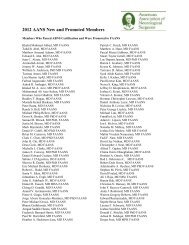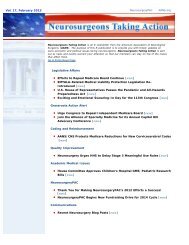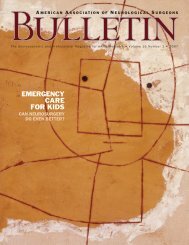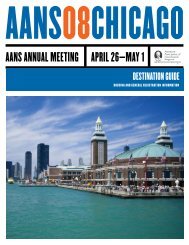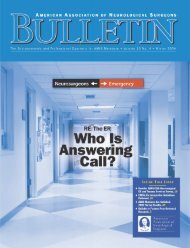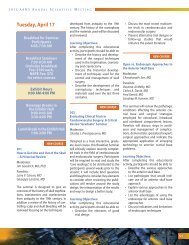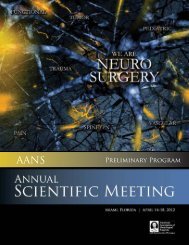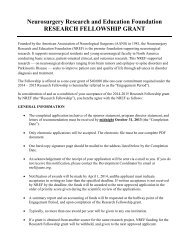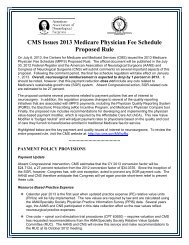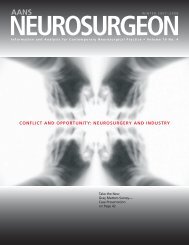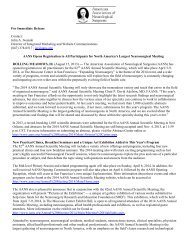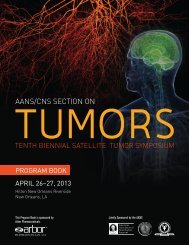view PDF - American Association of Neurological Surgeons
view PDF - American Association of Neurological Surgeons
view PDF - American Association of Neurological Surgeons
Create successful ePaper yourself
Turn your PDF publications into a flip-book with our unique Google optimized e-Paper software.
P RESIDENT’ S M ESSAGE D ONALD O . Q UEST, MD<br />
Pr<strong>of</strong>essional Conduct: Witness Testimony<br />
Membership in the AANS is voluntary<br />
and not a prerequisite to the<br />
practice <strong>of</strong> neurosurgery. Nevertheless<br />
there are obligations <strong>of</strong><br />
membership, and one <strong>of</strong> these is adherence<br />
to the AANS Code <strong>of</strong> Ethics.<br />
The AANS Code <strong>of</strong> Ethics addresses, in<br />
part, expert witness testimony. Such testimony<br />
as part <strong>of</strong> the practice <strong>of</strong> medicine is<br />
indeed an obligation <strong>of</strong> members <strong>of</strong> the<br />
medical pr<strong>of</strong>ession. The AANS is joined in<br />
this <strong>view</strong> by many prominent medical societies,<br />
among them the <strong>American</strong> Medical<br />
<strong>Association</strong> and the <strong>American</strong> College <strong>of</strong><br />
<strong>Surgeons</strong>. The AANS, the AMA and the<br />
ACS all provide their members with guidance<br />
on how to act pr<strong>of</strong>essionally and<br />
ethically in the legal arena. While documentation<br />
<strong>of</strong> this guidance is readily available<br />
from each <strong>of</strong> these organizations, a brief<br />
re<strong>view</strong> <strong>of</strong> salient points follows.<br />
The ACS Statements <strong>of</strong> Principles, most<br />
recently updated in 2004, avers that “expert<br />
witnesses are expected to be impartial and<br />
should not adopt a position as an advocate<br />
or partisan in the legal proceedings.” The<br />
expert also should be “familiar with the<br />
standard <strong>of</strong> care provided at the time <strong>of</strong> the<br />
alleged occurrence and should be actively<br />
engaged in practice <strong>of</strong> the specialty or the<br />
subject matter <strong>of</strong> the case at the time the<br />
testimony or opinion is provided.” The ACS<br />
additionally asks its members to sign and<br />
abide by the Expert Witness Affirmation,<br />
which sets forth 10 principles for expert<br />
witness testimony that include conducting<br />
a thorough, fair, and impartial re<strong>view</strong> <strong>of</strong> the<br />
facts, and providing testimony that is objective,<br />
scientifically based and helpful to a just<br />
resolution <strong>of</strong> the case.<br />
The AMA <strong>of</strong>fers guidance on medical<br />
testimony in its Code <strong>of</strong> Medical Ethics,<br />
which affirms that a physician’s participation<br />
in the legal system is “an ethical obligation.”<br />
In 2004 the AMA issued a report<br />
on medical testimony that addresses the<br />
physician’s ethical obligation to provide<br />
evidence in court, the general qualifications<br />
necessary for those who testify, and<br />
the importance <strong>of</strong> honest testimony. This<br />
report states that “expert witnesses should<br />
avoid inflammatory accusations…and<br />
must not merely <strong>of</strong>fer speculations but<br />
rather be able to substantiate claims on<br />
the basis <strong>of</strong> experience, published research,<br />
consensus statements or evidencebased<br />
guidelines….”<br />
The AMA report also stresses that testimony<br />
is to be impartial and has a higher<br />
goal than that <strong>of</strong> supporting the claims <strong>of</strong><br />
Donald O. Quest, MD,<br />
is the 2006–2007<br />
AANS president.<br />
either prosecution or defense: “Although<br />
the testifying physicians’ services may have<br />
been sought primarily by one party, [physicians]<br />
testify to educate the court as a<br />
whole.” The report further calls for impartial<br />
testimony that must not be false or misleading<br />
and for physicians providing expert<br />
testimony to have “recent and substantive<br />
experience or knowledge in the area in<br />
which they testify.”<br />
The report’s conclusion reinforces the<br />
concept <strong>of</strong> pr<strong>of</strong>essional conduct through<br />
adjudication <strong>of</strong> ethical infractions via a<br />
program that employs due process:<br />
“Organized medicine…[has] important<br />
roles to play in promoting the<br />
ethical conduct <strong>of</strong> physician witness<br />
activities. With careful attention to due<br />
process…organizations can help maintain<br />
high standards for medical witnesses<br />
by assessing claims <strong>of</strong> false or<br />
misleading testimony and issuing<br />
disciplinary sanctions as appropriate.”<br />
When the Pr<strong>of</strong>essional<br />
Conduct Program was initiated,<br />
guidelines for expert<br />
witness testimony were<br />
developed to ensure a<br />
standard <strong>of</strong> quality and<br />
impartiality on both sides <strong>of</strong><br />
pr<strong>of</strong>essional liability cases.<br />
The AANS Code <strong>of</strong> Ethics states in part<br />
that “expert testimony should reflect not<br />
only the opinions <strong>of</strong> the individual but also<br />
describe where such opinions vary from<br />
common practice; the expert should be<br />
engaged in active practice <strong>of</strong> surgery or be<br />
able to demonstrate enough familiarity<br />
with present practice to warrant designation<br />
as an expert, and should champion the<br />
truth [rather than] the cause <strong>of</strong> one party<br />
or other.”<br />
The AANS also developed the Rules<br />
for Neurosurgical Medical/Legal Expert<br />
Opinion Services document, which calls<br />
upon the neurosurgeon “to be an impartial<br />
educator for attorneys, jurors, and the<br />
court…not to be evasive for the purpose<br />
<strong>of</strong> favoring one litigant over another<br />
…and to re<strong>view</strong> all pertinent available<br />
medical information prior to rendering<br />
an opinion.”<br />
Complaints <strong>of</strong> ethics code violations<br />
are evaluated by the Pr<strong>of</strong>essional Conduct<br />
Committee through the Pr<strong>of</strong>essional<br />
Conduct Program. The program was initiated<br />
25 years ago, and its procedures<br />
have undergone some modifications over<br />
time. The program’s premise is that membership<br />
in a pr<strong>of</strong>essional organization<br />
requires conduct which meets a high pr<strong>of</strong>essional<br />
standard.<br />
Continued on page 4<br />
Vol. 15, No. 2 • 2006 • AANS Bulletin 3



